Alexander Hamilton
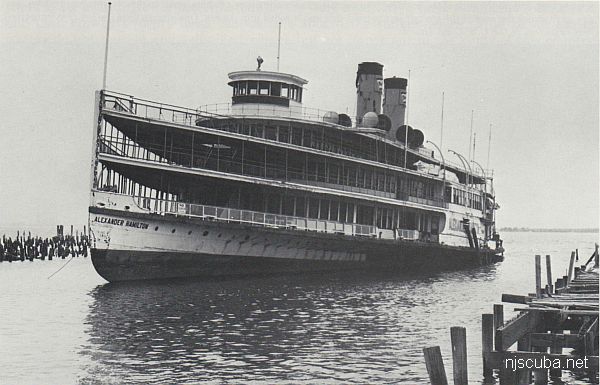
The Alexander Hamilton was the last of the steam-powered side-wheel riverboats of the Hudson River Day Line. Built in 1924, she ceased operations in 1971. A well-meaning group pulled the Hamilton from the mud in 1977 and moved her to a temporary berth along the east side of the Navy pier, planning to restore her as a museum. Unfortunately, at the new more-exposed location, the old vessel was sunk and reduced to scrap by a sudden storm in November of that year. The last records indicate that the wreck is still there, and you can even make out the outline on Google Earth.
The chart mark in the bay denotes the final resting place of the Alexander Hamilton, alongside the Navy pier in Leonardo. ( Seen here aground on a sandbar in Highlands, circa 1975. )
from AWOIS: 3337
H10049/82 -- OPR-B139-WH-82; WK IS 338.6 FT LONG WITH A 77 FT BEAM; POSITION NOT DETERMINED BY HYDROGRAPHER; BUOYS MARKING BOW AND STERN OF WK WERE LOCATED AND VERIFICATION DETERMINED POSITION OF WRECK FROM THESE POSITIONS; STACKS OF WK ARE VISIBLE AT MHW; EVALUATOR RECOMMENDS CHARTING AS SUNKEN WK WITH FUNNELS VISIBLE. (ENTERED MSM 8/87)
LNM33/83 -- 3RD CGD; DEPTH OF NAVY ADVISES SUNKEN STEAMER AT PIER 1 NAVAL WEAPONS STATION EARLE; PORT SIDE TO PIER WITH BOW OUT ON THE EASTERN FACE OF THE PIER; FOUNDERED AND SANK AT BERTH ON 8 NOV 1977; NO GP PROVIDED. LNM8/86--3RD CGD; PARTIALLY SUNK STEAMER HAS BEEN DETERMINED TO BE IN PA. (ENTERED MSM 2/86)
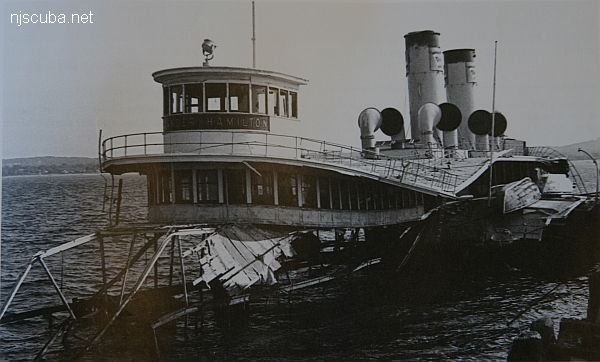
What a pity. Nothing is discernible above water in satellite imagery, although there is a ship-shaped shadow in the water.
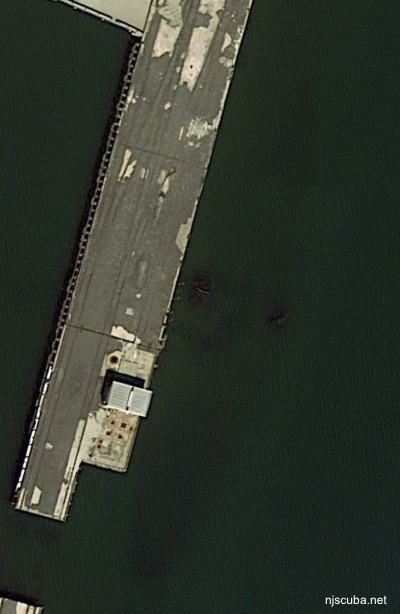
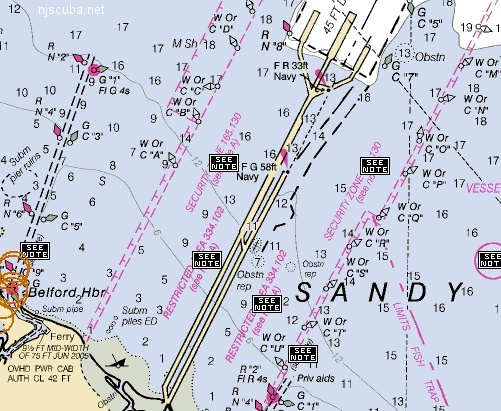
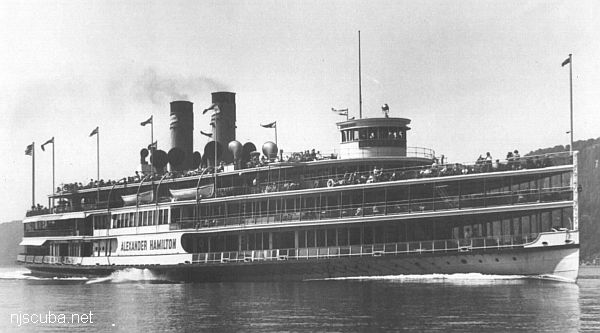
Sidewheels on the Hudson (1971)
We suppose that, to most people, the mention of a steamboat conjures up visions of a stately and speedy excursion vessel, possibly a sidewheeler, with broad decks and lots of cabin space surrounded by glass, which existed only on hot Sunday afternoons and which carried throngs of city folk to the local amusement park. This idea must, we are sure, be held by, thousands of city residents to whom the local excursion steamer was the only ship they ever rode on, or possibly ever saw.
Each major city situated on a lake or river had its local version. To Torontonians, it was the mighty beam-engined CHIPPEWA or latterly the CAYUGA; to Buffalo, it was CANADIANA or AMERICANA; to Chicagoans, it was CHRISTOPHER COLUMBUS, and to the holiday crowds in Detroit, it was the "Glass Hack, " TASHMOO, But the times have changed and sweltering city denizens now look elsewhere for amusement! Parks are now places to get to in the family auto and the thought of going by boat does not enter the mind. And well it might not, since the change in travel attitudes has spelled the end for the large excursion steamer. Here and there we find a little diesel tourist boat, or a ferry being used in the excursion trade, but CHIPPEWA and her kind have passed from us.
Well, almost, that is. In one of the most unlikely places, there still operates an example of what older folk remember with nostalgia and what their children do not really comprehend. Yes, ALEXANDER HAMILTON is alive and well and living in New York City, This beautiful, big paddler still runs daily cruises up the Hudson River during the summer months and, we might add from experience, does not suffer from a lack of patronage.
The HAMILTON is now owned by Circle Line Sightseeing Yachts Inc., a most unattractively named company that runs tours of New York harbor and which, several years ago, purchased the last remains of what was generally known as the Hudson River Day Line. Still operating under the Day Line name, ALEXANDER HAMILTON is the last remnant of a fleet that included such notable sidewheelers as MARY POWELL, ALBANY, NEW YORK, ROBERT FULTON, HENDRICK HUDSON, the ill-fated WASHINGTON IRVING and a number of propellers, the last of which was PETER STUYVESANT. The HAMILTON herself was built in 1924 by the Bethlehem Shipbuilding Corp. at Sparrows Point, Maryland. She measures 338.6 feet in length, 77 feet of beam over the guards, and 13.6 feet in depth. Her sidewheels are driven by triple expansion engines having cylinders of 36 1/2, 56 and 85 inches and a stroke of 72 inches, and fed by two single-ended and two double-ended oil-fired Scotch boilers. Her wooden superstructure accommodates four passenger decks.
Each day, shortly after 10:00 a.m., ALEXANDER HAMILTON pulls away from Pier 81, North River, located at the foot of West 42nd Street, and heads upstream. The first stop about two and a half hours distant, is Bear Mountain, the site of a popular state park. The ship fan who, until this landing has had to bear hordes of screaming children, the roar of transistor radios, and the general crush of bodies, will find things much easier past Bear Mountain as the best part of the mob will have rushed ashore, eager to commence the job of filling the park with tons of litter. The steamer continues upstream for another half hour and then calls at West Point, the location of the famous military academy. After a short pause, she departs for a leisurely cruise to Poughkeepsie and back, the stop at this port having been discontinued after the unfortunate disintegration of the wharf some years ago. The ship, after picking up the hordes again at West Point and Bear Mountain, makes her way downstream, arriving back at New York shortly after 7:00 p.m. Considering the distance traveled and the length of time spent aboard, we would class the $5.50 round trip fare to Poughkeepsie as a great bargain and one not to be missed by visitors to New York City.
The ship herself is, of course, the highlight of the trip, although the scenery along the river is very beautiful. Our readers would probably spend most of the trip standing around the engine pit watching the machinery in action. Like most sidewheelers, her engine room is completely open to view. The cabins are, for the most part, devoid of anything interesting, being completely empty save for folding chairs and tables. Twelve parlors are available for those who wish for private accommodation. The cabins do contain some old paintings but the years have not treated them kindly, nor have thousands of grubby hands. Generally speaking, the ship's woodwork is in excellent condition. The most interesting part of the upper works is the pilothouse with its huge name board and the massive pilot wheels, kept as a standby in case of failure of the steam steering gear.
Passengers desiring good food aboard ALEXANDER HAMILTON will have to bring it with them, as dining facilities leave much to be desired. The beautiful dining room, located aft on the main deck, with its huge observation windows and gold trim, has deteriorated to a grease joint, the like of whose food and service your editor has never seen and never wishes to see. This can, however, be excused up to a certain point because of the masses of people carried, making gracious dining an impossibility.
All in all, the HAMILTON is well worth a trip to New York, but you had better make it soon! The Day Line has ordered and will soon take delivery of a diesel-powered abortion to be christened DAYLINER. She is allegedly intended to replace the venerable steamer and the HAMILTON is said to be headed for retirement after her last sailing of the season on Labor Day, The company has refused to commit itself on this point in view of the good business enjoyed by the operation, and it is still possible that the ship will be retained. Nevertheless, being of wood above the main deck, she cannot last forever and maintenance will someday reach the point where cost will dictate a retirement, even if the ship survives the upcoming crisis.
If retired, ALEXANDER HAMILTON seems headed for the South Street Seaport museum development, but think how much better it would be to see her in operation now. Where else in 1971 can you get a nine-hour ride on a steam-powered sidewheeler?
Reproduced for the Web with the permission of the Toronto Marine Historical Society
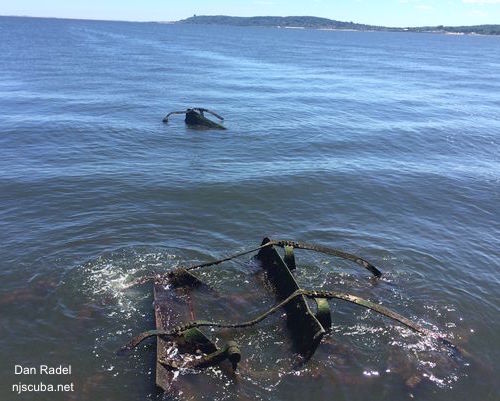
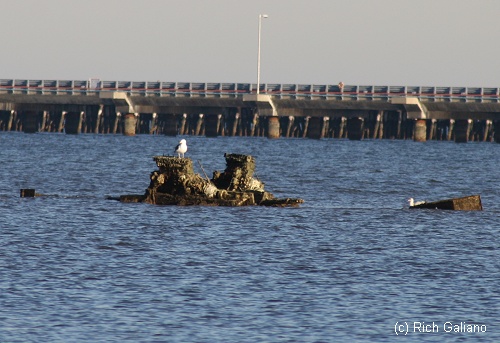
from AWOIS: 6834
H10049/82 -- OPR-B139-WH-82; WOODEN WRECK, 6 X 30 FT.; BARING 4 FT. MLW; WRECKAGE (ENGINE BLOCK AND KEEL RIBS) LAYS IN A NORTH-SOUTH DIRECTION. (ENTERED MSM 8/87)

Questions or Inquiries?
Just want to say Hello? Sign the .